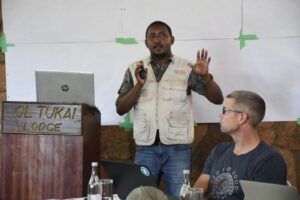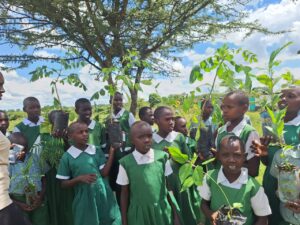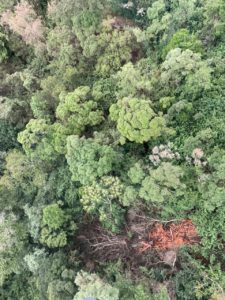 This has been a busy month for Mara Elephant Project rangers who covered 1,345 kilometers on foot patrol, the most of any month so far in 2019. This extra patrolling accounted for an overall increase in incidents of illegal logging and charcoal production reported. In November, MEP rangers confiscated 4,140 illegal pieces of wood and destroyed 87 kilns mostly in the Mau, Loita and Nyakweri forests. The Karen Blixen Camp Trust helicopter was also used toward the end of the month to do some reconnaissance of illegal logging and charcoaling sites (pictured left). MEP Director of Research & Conservation Dr. Jake Wall hosted Dennis Schneider from Vulcan who is helping MEP with our EarthRanger system. He helped the research department configure GLAD alerts that identify areas that have been deforested in near real-time based on Landsat imagery. We’ve begun using the alert location as patrol targets for our ranger teams and have been able to identify many more illegal logging sites across the Mau, Nyakweri and Loita forests than in previous months.
This has been a busy month for Mara Elephant Project rangers who covered 1,345 kilometers on foot patrol, the most of any month so far in 2019. This extra patrolling accounted for an overall increase in incidents of illegal logging and charcoal production reported. In November, MEP rangers confiscated 4,140 illegal pieces of wood and destroyed 87 kilns mostly in the Mau, Loita and Nyakweri forests. The Karen Blixen Camp Trust helicopter was also used toward the end of the month to do some reconnaissance of illegal logging and charcoaling sites (pictured left). MEP Director of Research & Conservation Dr. Jake Wall hosted Dennis Schneider from Vulcan who is helping MEP with our EarthRanger system. He helped the research department configure GLAD alerts that identify areas that have been deforested in near real-time based on Landsat imagery. We’ve begun using the alert location as patrol targets for our ranger teams and have been able to identify many more illegal logging sites across the Mau, Nyakweri and Loita forests than in previous months.
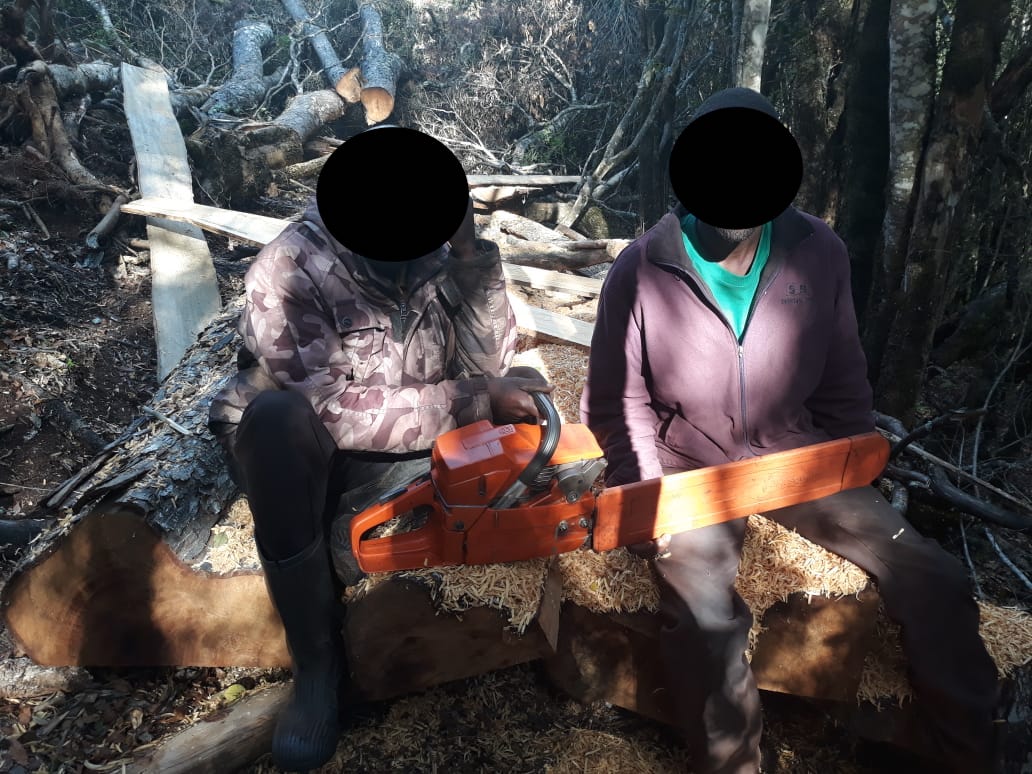 The arrest on November 5 of two suspects with a pit saw and illegal logs.
The arrest on November 5 of two suspects with a pit saw and illegal logs.
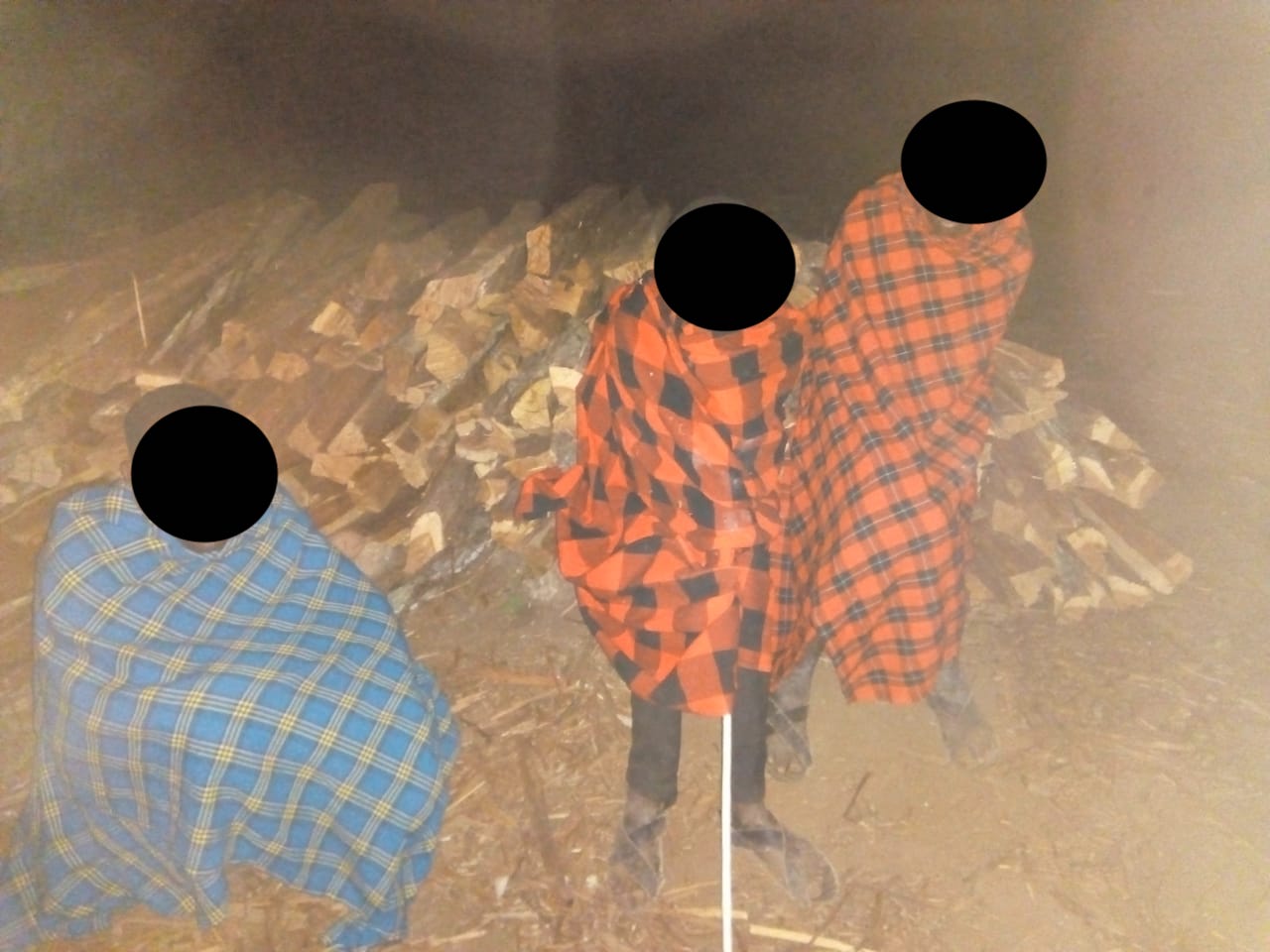
Three suspects arrested in Loita with 800 cedar posts on November 8.
These forests are in need of more protection, so it’s nice to see that on November 1, a tree planting initiative took place in the reclaimed areas of the Mau Forest. Spearheaded by the Kenyan Government, MEP was invited to the launch together with the Cabinet Secretary for Environment, Kenya Wildlife Service, Kenya Forestry Service, Police, Administration and NGO Stakeholders. The Cabinet Secretary Ministry of Environment and Forestry Hon. Keriako Tobiko led the team in planting over 200,000 seedlings manually and oversaw 4.5 million seeds planted through aerial seeding.The rehabilitation process has been an overall success and already a number of plants have started to grow in the previously settled areas. We plan to drop indigenous pioneer tree species like Dombeya Torrida on the steepest areas using the Karen Blixen Camp Trust helicopter with Seedballs Kenya and DTB Bank. We believe this will further augment the much-needed rehabilitation process in this area. Speaking of, MEP received two Seedballs Kenya donations this month totaling 35 kg of seed balls for MEP rangers to distribute in the Mara, thank you for donating.

MEP CEO Marc Goss at the tree planting initiative with multiple private and government organizations present.
MEP rangers removed 25 snares during the month of November. The result of these bushmeat poaching tools affecting elephants was directly seen on November 7 when a baby elephant with a nasty snare wound around his leg needed treatment from Kenya Wildlife Service Vet Dr. Limo. The Karen Blixen Camp Trust helicopter was crucial to this operation as MEP CEO Marc Goss was tasked with keeping the baby’s mother away from the treatment scene. Unfortunately, not all treatments work on wildlife and despite our best efforts this calf succumbed to his wounds by the end of the month.
 Dr. Limo treating the elephant calf from a snare wound that unfortunately succumbed to the wound later in the month.
Dr. Limo treating the elephant calf from a snare wound that unfortunately succumbed to the wound later in the month.
 Training continues at MEP HQ (pictured left) of the new Sheldrick Wildlife Trust (SWT) Mau De-Snaring Unit and the new Loita ranger team. All trainees will complete their session soon and be deployed into these areas for much needed additional protection. Finally, on November 30, MEP intelligence took place in an ivory recovery of 12 kg which was handed over to the Tanzanian authorities to follow up on the investigation.
Training continues at MEP HQ (pictured left) of the new Sheldrick Wildlife Trust (SWT) Mau De-Snaring Unit and the new Loita ranger team. All trainees will complete their session soon and be deployed into these areas for much needed additional protection. Finally, on November 30, MEP intelligence took place in an ivory recovery of 12 kg which was handed over to the Tanzanian authorities to follow up on the investigation.
There were six incidents of human-elephant conflict to report in November. Fortunately, all were able to be addressed using the ranger vehicle and/or firecrackers. MEP collared a female elephant, Alice, on November 26 in the Kericho part of the Mau Forest. The collaring operation was difficult with thick vegetation and elevation and the Karen Blixen Camp Trust helicopter kept all personnel and the elephant safe. This is our fourth elephant collared in the Mau Forest, and 20th overall, gaining MEP new insight into how elephants are using the forest and ensuring better protection for this vital part of the Mara ecosystem.
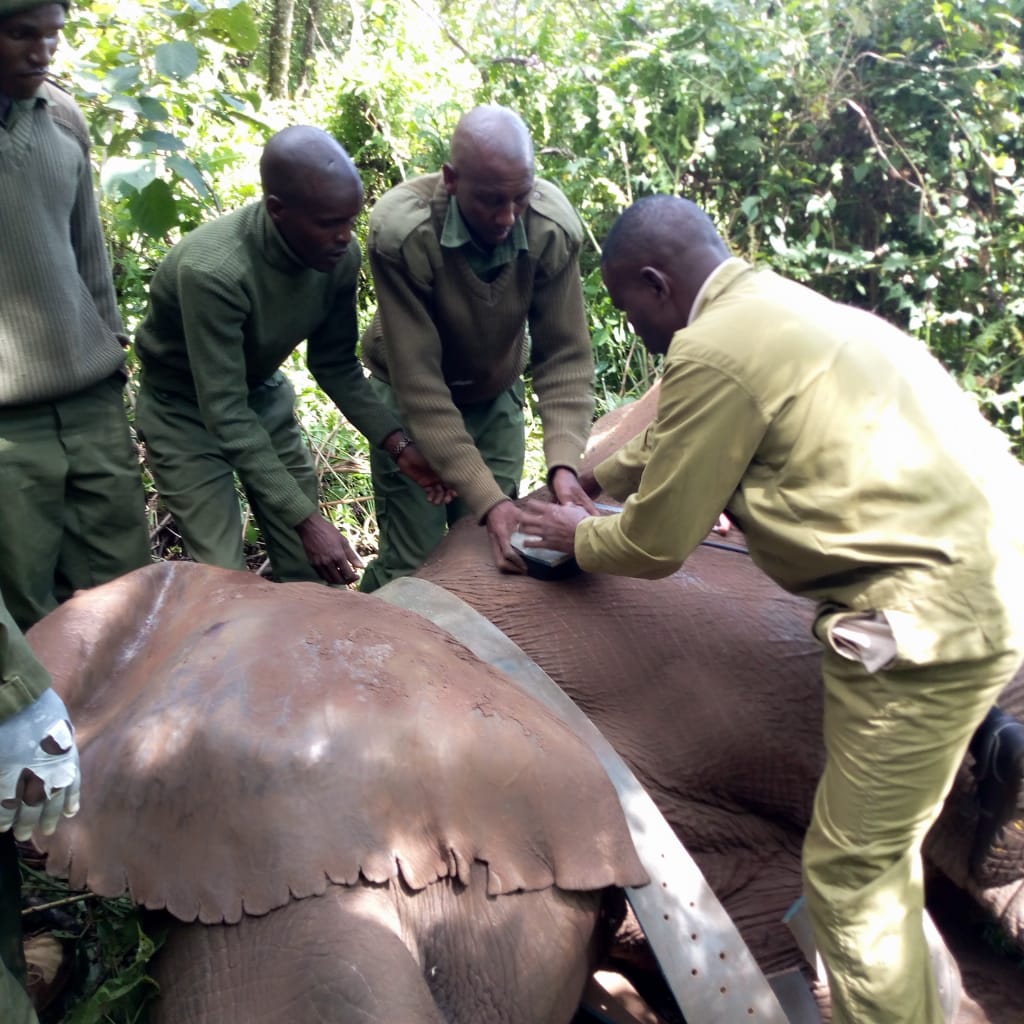
The collaring operation of Alice, an elephant supported by the McCormick Family Foundation.
MEP purchased a new Kibo motorbike (made locally in Kenya) to continue with our fence line mapping field work. In conjunction with the Njia app and the landDx database we hope to make further progress in mapping fence proliferation across the Mara in the coming months. To this point, Dr. Jake Wall joined colleagues from the One Mara Partnership Research Hub in Narok for a meeting about contributing to the Narok County Government spatial plan. MEP will be contributing outputs from our tracking program, such as overall elephant range, core hotspots, corridors and connectivity metrics to the NCG spatial plan to help ensure that elephants are well represented in conservation planning.
MEP Monthly Report November 2019

Twende Porini took place in early November with Wilson Sairowua joining the kids at Asilia to present about Mara Elephant Project (pictured right). The Angama Foundation hosted MEP’s Director of Research and Conservation Jake Wall on November 28 for the annual Greatest Maasai Mara grand prize event. MEP received a check of $20,300 from the Angama Foundation, which reflected their total support in 2019. Overall, in 2019, MEP had 138 entries, the most of any organization and we had one finalist in the top 10, Gurcharan Roopra. We were also delighted to learn that the Angama Foundation has approved a three-year grant to MEP of $30,000 per year. This long-term commitment to the conservation of the Mara establishes Angama as leader in eco-tourism.
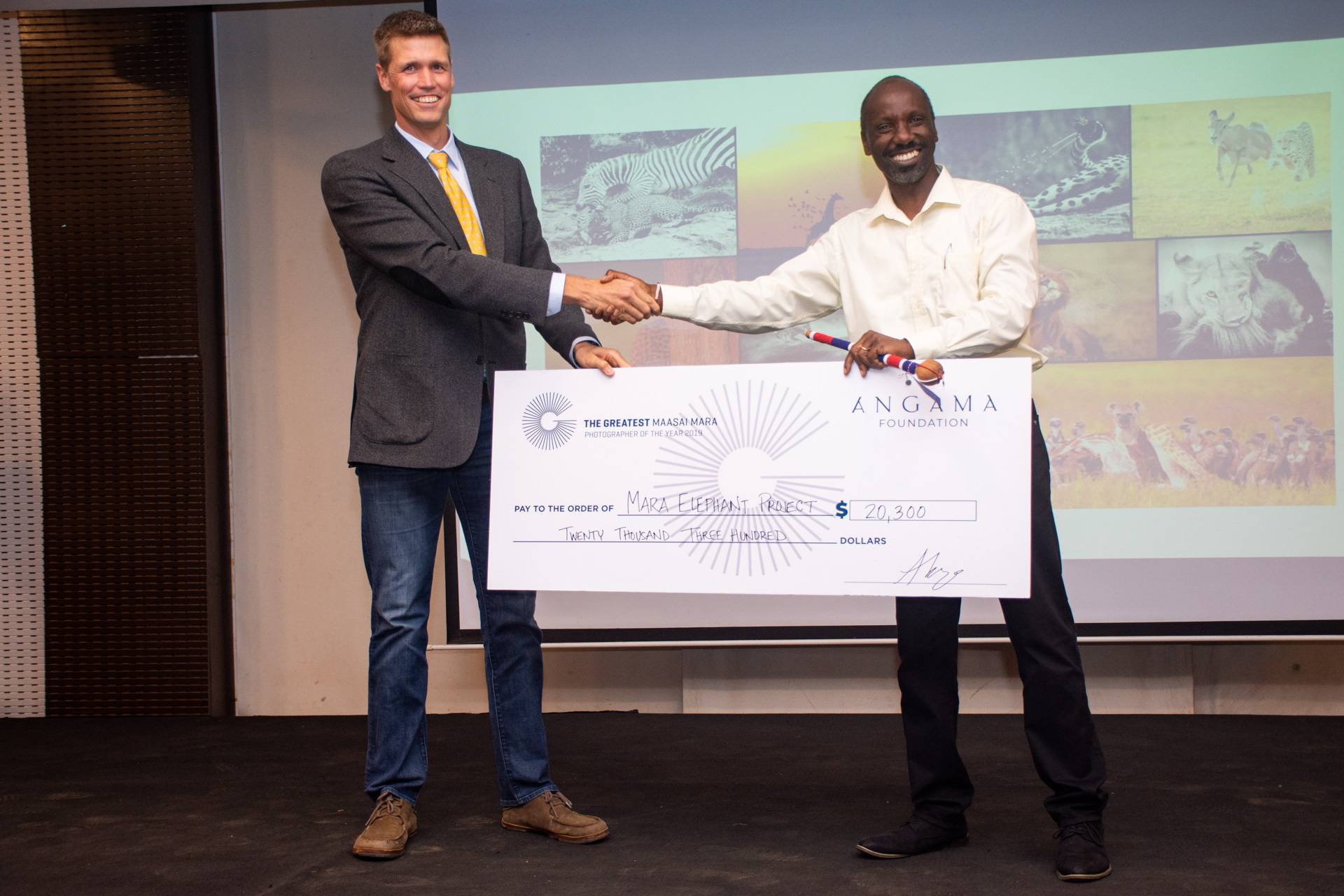 MEP Director of Research & Conservation Jake Wall accepting a check at the ceremony in Nairobi.
MEP Director of Research & Conservation Jake Wall accepting a check at the ceremony in Nairobi.
